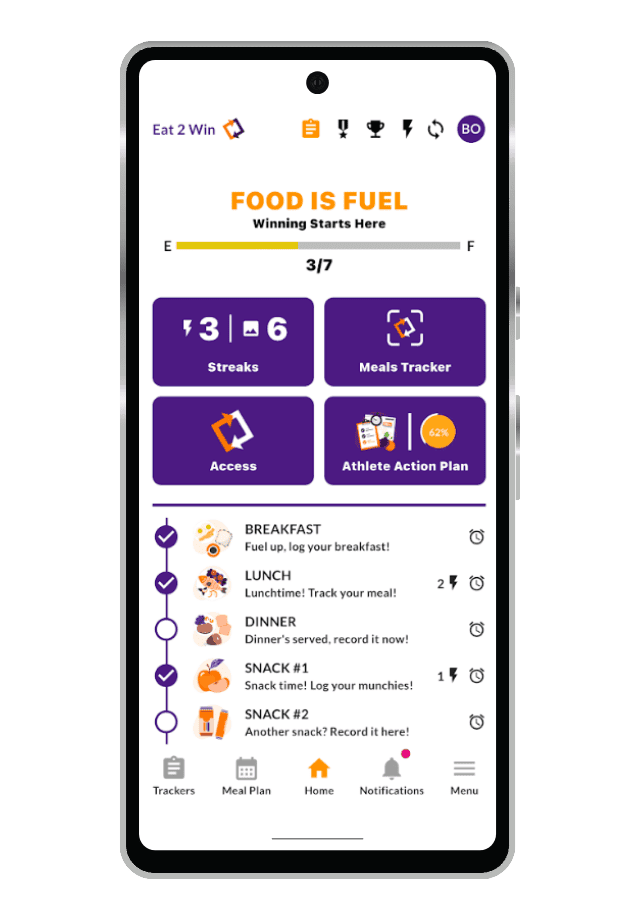Next Level Podcast with Host Tavis Piattoly, MS, RD, LD
- eatingonabudgetfinal-converted00:00

Christine Turpin, RD, CSSD, LD
Registered and Licensed Dietitian and strength and conditioning specialist. She is a certified health fitness specialist and personal trainer through the American College of Sports Medicine.
Grocery shopping on a budget can be a challenge. Christine Turpin has some great advice for putting together a grocery shopping budget and how to find affordable groceries at the store that are still nourishing and appropriate for athletes. Christine Turpin is a Registered and Licensed Dietitian and a Strength and Conditioning Specialist. She is a Certified Health Fitness Specialist and Personal Trainer through the American College of Sports Medicine. A certified spinning instructor, she owns Nourish 2 Perform, a nutrition and fitness consulting company in the Annapolis-Baltimore region. Christine’s clients with Nourish 2 Perform include Stevenson University, Fairfax County Criminal Justice Department, 368 Athletics, and Athletic Performance Inc. She holds a bachelor’s degree in Dietetics from the University of Maryland and received her bachelor’s degree in Adult Health (Kinesiology) from Bloomsburg University. Christine grew up playing sports and was a competitive athlete. She played collegiate field hockey, was an All-American field hockey player and part of a National Championship team at Bloomsburg University! Christine continues to stay fit and strong through competitive running and cycling events and throwing around weights at the gym. In her spare time you can find her kayaking on the bay with her husband, sailing and water skiing and hanging out with family and good friends.
In this podcast you will learn:
- Tips to help athletes learn how to shop smart
- Is it beneficial to go to the grocery with a list and does it save you money
- If there a difference in quality and nutritional value between store and named brand products
- If there’s an advantage for athletes to eat organic foods and is there any research that Christine’s aware of that eating organic will improve health and performance
- Is Eating Healthy more expensive than eating foods with less nutritional value
- Inexpensive foods athletes can purchase that can be included as part of a healthy and well balanced diet.
- Inexpensive higher calorie options to include on the grocery list options that can be part of a balanced diet, especially for athletes looking to gain weight
- The world of EXTREME COUPONING and should athletes consider using coupons if they can find a deal or is this too time consuming and not worth the time and effort
- Phone apps people can use that makes shopping easier
- Her new eBook titled Grocery Shopping on a Budget: Save Time and Money.
- Topics she discusses in the Ebook?
Podcast Transcript
1:13 Welcome by Tavis Piattoly
2:12 Introduction to Christine Turpin
3:49 Tips to help athletes learn how to shop smart.
- Get a variety of nutrients from different sources.
- The athlete’s plate should consist of whole grains, lean protein, fruits and vegetables, low fat dairy, healthy fats and plenty of fluids.
- Whole grain sources: pasta, rice, potatoes, cereal
- Protein sources: turkey, chicken, seafood, beans and nut butters
- Fruits and vegetables: provide antioxidants, vitamins and minerals
- Healthy fats: oils, nuts, seeds
- Low fat dairy: milk, cheese, yogurt
- I like to stress three things: plan, prepare and research ahead of time. If you stick to these three things, it will help you stay within your budget.
- Research what’s on sale and where, and plan the week's meals around sale items.
- Shop at grocery stores that are discounted. You can find good snacks like turkey jerky and sunflower seeds that don’t cost a lot of money.
8:05 Is it beneficial to go to the grocery with a list and does it save you money?
- Yes! A list keeps you on task.
- A list will prevent you from forgetting your items that you need.
- Your list will give you an idea of what your bill will be, so you won’t be surprised at check out.
- It’s easy to get side tracked without that list. A distracted shopper tends to buy more unnecessary ingredients which takes more money out of your wallet.
- With a list, you are able to make mindful purchases rather than compulsive purchases.
- The more prepared you are when you get to the store, the less impulse purchases you’ll make and more money you’ll keep in your pockets.
10:10 Is there a difference in quality and nutritional value between store and named brand products?
- The only difference between store and name brand products is price.
12:09 Is there an advantage for athletes to eat organic foods and is there any research that Christine’s aware of that eating organic will improve health and performance?
- Organic is more expensive due to the organic farming practices. It is a much smaller industry than conventional food and farming. Organic refers to the way that farmers grow and process food. Organic farming doesn’t use chemicals or pesticides to promote plant growth. Don't treat the animals with antibiotics or growth hormones to prevent disease or enhance growth.
- Not all organic foods are more expensive.
- Look for fruits and vegetables that are in season, locally grown, because sometimes they are similar in price to nonorganic food.
- If your budget allows, consider buying organic produce from the suggested dirty dozen list that can be found on the Environmental Working Group website. Fruits and vegetables on this list have the most pesticide residue levels.
- Eating conventionally grown produce is far better than not eating any fruits and vegetables, at all. Something to keep in mind.
- Researchers concluded that organically and conventionally produced food are comparable in nutrient content, however the research is ongoing.
- Eating organic versus conventional food will not give you a leg up in competition.
16:40 Is Eating Healthy more expensive than eating foods with less nutritional value.
- Focus on high performance foods that are rich in nutrients compared to overall calories. Ex. nut butters, seeds and avocados.
- Steer away from foods with empty calories with very little nutritional value like soda, chips and candy.
- Use the unit price to save money. Large containers of oatmeal and blocks of cheese are typically cheaper than prepackaged single serve items. Try to buy in bulk.
- Include frozen fruits and vegetables. If you find that your produce goes bad before you can eat it, save money by buying frozen. It’s always there and you can pull it out of the freezer as you need it.
19:06 Inexpensive foods athletes can purchase that can be included as part of a healthy and well balanced diet.
- Consider buying frozen or canned fruits and vegetables, or fresh in season.
- Try to focus on plant based protein sources, i.e. beans, lentils, nuts, nut butters, also canned chicken and tuna, jerky, eggs or store brand egg substitute.
- Whole grains: brown rice, sweet potatoes, potatoes, oatmeal, bread
- Dairy: milk, yogurt, string cheese
- Healthy fats: nuts, seeds, olives, olive and canola oil
22:13 Inexpensive higher calorie options to include on the grocery list options that can be part of a balanced diet, especially for athletes looking to gain weight.
- Focus on high performance nutrient dense foods.
- No fast food!
- Nuts, seeds, dried fruit, trail mix, 100% juices and nut butters are always my go to’s or athletes that need to gain weight and gain some lean muscle.
- Peanut butter and jelly, honey or bananas are easy. It’s fast, convenient and doesn’t spoil.
- Make your own at home. Make a smoothie, tea or coffee at home rather than buying out. Pack a lunch at home and stash some snacks in your bag.
- Get in the kitchen and start cooking. Cook meals to freeze. It’s easier, cheaper and healthier than eating out.
26:50 The world of EXTREME COUPONING and should athletes consider using coupons if they can find a deal or is this too time consuming and not worth the time and effort?
- Doesn’t have to take a lot of time. Take a few moments to browse coupons in the morning when sipping coffee, or while waiting for a ride to practice.
29:16 Phone apps people can use that makes shopping easier.
- There are phone apps to:
- Manage your grocery list
- Provide nutrition education
- Locate a farmers market
- Teach you proper food safety.
- How long you should keep leftovers in the refrigerator
- What temperature you should grill your chicken
- I use an app called Out of Milk, to manage my grocery store list. It’s easy to navigate at the store because it categorizes the food on your list.
31:06 Her new eBook titled Grocery Shopping on a Budget: Save Time and Money.
- Provides athletes with tools to identify high performance foods.
- Teaches skills to implement a nutrition plan on a budget.
- Give athletes a step-by-step plan to maximize the potential in their sport.
32:07 Topics she discusses in the Ebook?
- Food sources that make up the athlete's plate.
- How to navigate through the grocery store.
- Compare prices using unit prices.
- Teach how to plan, prepare and research.
- Tips to keep more coin in your pocket.
- Tips on how to stock your backpacks with energy dense snacks and meals.
- Cooking at home rather than fueling on the fly.
- The ebook can be found at: https://www.myathleteseatingonabudget.com
- or Twitter #athleteseatingonabudget
33:22 Closing remarks from Christine Turpin
- Try not to be overwhelmed
- Don’t have to spend a lot of money
- Be mindful of where the money is going
- Have fun!
Eat 2 Win Nutrition App
Fuel the Champion Within
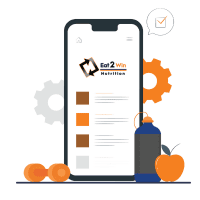
Trackers
Stay on target with cutting-edge trackers that monitor every step of your journey, ensuring you never miss a beat.
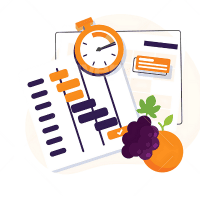
Meal Plan Guides
Simplify your nutrition with easy-to-follow, personalized meal plans that fuel your performance.
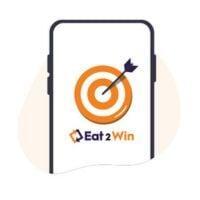
Gamification
Stay motivated and engaged by earning rewards and climbing leaderboards as you hit your fitness and nutrition goals.

Access a Sports Dietitian
Get expert guidance and personalized support from a certified Sports Dietitian whenever you need it.
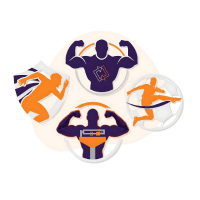
Personalized Programs
Unlock your full potential with personalized programs meticulously crafted to match your unique lifestyle and fitness aspirations.

